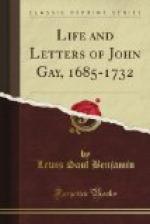Yet a third extract from this satirical “Proeme” must be given, and this in connection with the language of these eclogues: “That principally, courteous reader, whereof I would have thee to be advertised (seeing I depart from the vulgar usage) is touching the language of my shepherds; which is soothly to say, such as is neither spoken by the country maiden or the courtly dame; nay, not only such as in the present times is not uttered, but was never uttered in times past; and, if I judge aright, will never be uttered in times future. It having too much of the country to be fit for the court, too much of the court to be fit for the country; too much of the language of old times to be fit for the present, too much of the present to have been fit for the old, and too much of both to be fit for any time to come. Granted also it is, that in this my language, I seem unto myself, as a London mason, who calculateth his work for a term of years, when he buildeth with old material upon a ground-rent that is not his own, which soon turneth to rubbish and ruins. For this point, no reason can I allege, only deep learned examples having led me thereunto.”
All this is pretty fooling; but Gay, who in the beginning intended “The Shepherd’s Week” to be merely a burlesque, according to the suggestion of Pope, was carried away by his interest in the subject-matter, and produced a poem of undoubted value as a picture of rural life in his own day. With it he won approval as an original poet in his own day, and three centuries after critics still write in praise of it.
“These Pastorals were originally intended, I suppose, as a burlesque on those of Philips’; but, perhaps without designing it, Gay has hit the true spirit of pastoral poetry,” Goldsmith said; and Dr. Johnson wrote: “The effect of reality of truth became conspicuous, even when the intention was to show them grovelling and degraded. These pastorals became popular, and were read with delight, as just representations of rural manners and occupations, by those who had no interest in the rivalry of the poets, nor knowledge of the critical disputes."[4] Southey, too, had a kind word to say: “In attempting the burlesque Gay copied nature, and his unexpected success might have taught his contemporaries a better taste. Few poets seem to have possessed so quick and observing an eye"[5]; and, coming to the present critics, Mr. Austin Dobson utters commendation: “The object went far beyond its avowed object of ridicule, and Gay’s eclogues abound with interesting folk-lore and closely studied rural pictures."[6]




